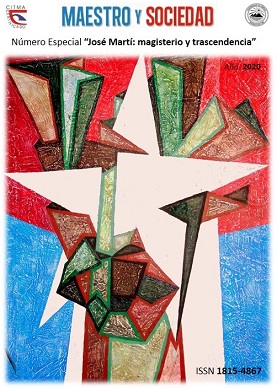A cautious martian towards the language
Array
Keywords:
Language, Aphorisms martianos, CultureAbstract
In the performance of Cuban education, every teacher must be aware of the importance of mastering their mother tongue because it is an inseparable part of their culture and, above all, of their professional skills and tools. It is a personalized responsibility to ensure this, so it is essential that, regardless of the subject taught by the teacher, you must be a good reader and a good communicator. In this way he would serve as an example to his students, as Master José Martí has been for all his followers. Marti's gifts as a speaker may have been questioned by some people who doubt so many aphorisms put in his name, but the one who through reading and research gets to know the Master's conception of language, would not hesitate for a second that that great talent of the language knew from his own perception to defend the correct use of language. That is why the present work investigates why we should not doubt Martí's loquacity and is raised through a proposal that leads to reflection towards the careful use of language through a Martian look.
References
2. Domínguez G., I. (2009). Comunicación y texto. La Habana: Editorial Pueblo y Educación.
3. Domínguez G., I., et al. (2013). Lenguaje y Comunicación. La Habana: Editorial Pueblo y Educación.
4. Fernández, M. (2017). La educación según la óptica martiana. Revista Maestro y Sociedad, (Número Especial 165 Aniversario del Natalicio de José Martí), 3-12. Recuperado de https://maestroysociedad.uo.edu.cu
5. Fuentes, M. y Tejera G., J. L. (2018). La articulación del arte y la literatura en José Martí: potencialidades para el fortalecimiento del proceso docente educativo. Revista Maestro y Sociedad, (Número Especial 165 Aniversario del Natalicio de José Martí), 107-120. Recuperado de https://maestroysociedad.uo.edu.cu
6. Montaño, J. R. y Abello A. M. (comp.). (2010). (Re) novando la enseñanza-aprendizaje de la lengua española y la literatura. La Habana: Editorial Pueblo y Educación.
7. Pérez B, J. A. (1973). Obras Completas. La Habana: Editorial de Ciencias Sociales.
8. Rodríguez P., L. (2009). Las cosas que se quedan. La Habana: Editorial Pueblo y Educación.
9. Roméu E., A., et al. (2007). El enfoque cognitivo, comunicativo y sociocultural en la enseñanza del español y la literatura. La Habana: Ed. Pueblo y Educación.
10. Roméu E., A., et al. (2013). Didáctica de la lengua española y la Literatura. La Habana: Editorial Pueblo y Educación.
11. Valdés G., R. (1877). Diccionario del pensamiento martiano. Guatemala: (s.e.).
Published
How to Cite
Issue
Section
License
This journal provides immediate open access to its content, based on the principle that offering the public free access to research helps a greater global exchange of knowledge. Each author is responsible for the content of each of their articles.



























 Universidad de Oriente
Universidad de Oriente 